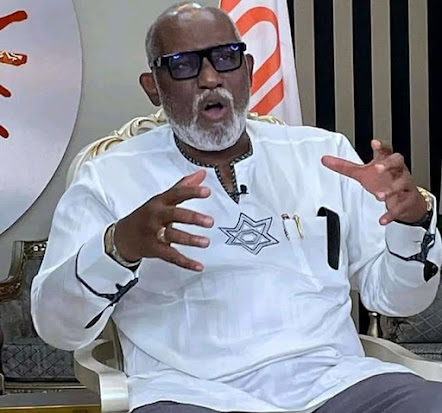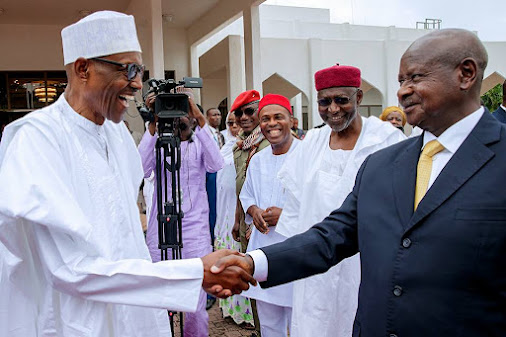By Adekunle Adekoya
A fortnight ago, I started this column lamenting that we always have one issue to contend with all the time. I had wanted to vent my anger on power supply providers, the ones we call DisCos here, following weeks of uninterrupted blackout in many parts of the country.
*Tinubu and BuhariThen news of the well-choreographed killings in Plateau State broke. We all
lamented the failures of a reactive, rather than proactive security
architecture that failed, time and again, to anticipate and prevent the
marauders from achieving their evil objectives.
As our leaders were mouthing the
usual rhetoric about the Plateau killings, convincing very few of us that
action will be taken to prevent recurrences, Betta Edu happened to Nigeria.
A memo,
said to have been signed by the suspended minister directing payment of more
than N585 million into a private account ruled the internet for days and
dominated conversations on many platforms. Earlier, as we all know, the CEO of
the National Social Intervention Programme, Halima Shehu had been suspended to
pave way for investigations into how N44 billion of the agency’s funds found
its way into private accounts.
To complete the picture, former
Minister of Humanitarian Affairs, Poverty Alleviation and Disaster Management,
Sadiyya Umar Farouq became a guest of the EFCC over some N37 billion of the
ministry’s money that had vanished.
My commentary will begin from
the demographic angle. Please take note that Sadiyya Umar Farouq is the eldest
of the trio, born in 1974. Halima Shehu was born in 1978, while Betta Edu was
born in 1986, a confirmed millennial. By the way, millennials are people born
between 1981 and 1996. None of the three is 50 years old yet, though Sadiyya
will hit that milestone next November. By their conduct in office, they have
sent the wrong signals and did incalculable damage to the school of thought
that believes that Nigeria’s problems have to do with the old and ageing class
of leaders that have refused to let go.
Once now and then, a president
incubates a magician that is presented to the rest of us as a minister. Buhari
had at least two of them. One tried to conjure a national carrier for us out of
the thinnest air in Nigeria. The other, of course, is Sadiyya. If she isn’t a
magician, how did she spend more than N500 million to feed schoolchildren who
were in their parents’ houses during the COVID-19 lockdown? Another magical
feat was how her ministry trained 177 youths on smartphone repairs, and spent
N5.9 billion on that. I thought that N5.9 billion could be spent to open a
factory or two that will manufacture smartphones!
It is somewhat surprising that Betta Edu could commit the offence she was accused of. What happened to her mind if education is what remained after one has forgotten what was learnt? She had been a cabinet commissioner in Cross River State, and must have been conversant with the proper procedures when it comes to spending government money.
Or she was freewheeling on Cross River money and blind eyes were turned?
Beats me how a beautiful, trained medical doctor could self-destruct this way.
She could as well be one of Tinubu’s magicians, afterall she was said to have
approved N2.5 million as air travel expenses for an aide to a state that has no
airport. Was she trying to conjure an airport for the state?
I am equally disturbed by Halima
Shehu’s predicament, given her educational background and work experience as a
banker. At Inter-City Bank where she worked for about a decade, she
served as Audit and Internal Control officer, among other duties. What
happened to her experience when she came to work for government?
From their backgrounds, these
women knew the right things to do, just simply opted to do what they wanted.
To the Federal Government and President Bola Tinubu, it’s reforms time. I propose that the Ministry of Humanitarian Affairs, Poverty Alleviation and Disaster Management be scrapped without delay. My reasons are simple: there has been nothing humanitarian about that ministry since Buhari created it.
The conditional cash transfer programme of the ministry was a failure, even from conception. What can N5,000 do for anybody in Nigeria, even before subsidy removal, not to talk of now. It is simply wasteful, and besides, unjust as nobody knows the criteria by which beneficiaries were chosen.
What is worse is that the ministry seems to have
become the ATM machine of some vested interests. Want some millions? So a
proposal and take there. In addition, the ministry has failed to alleviate
poverty; there is no initiative of this ministry that has the interest of masses
at heart. But it has generated the disasters that these women have become. The
ministry should be scrapped before it generates more disasters.
*Adekoya is a commentator on public issues
.jpeg)



















